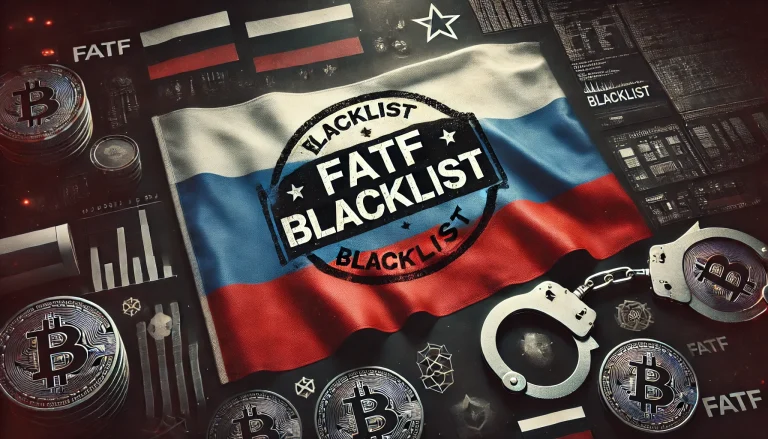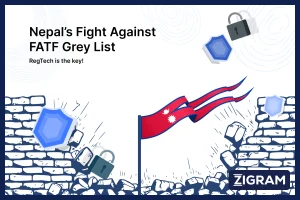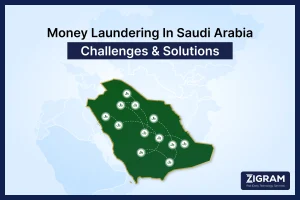The Financial Action Task Force, which is the global standard-setter in the fight against money laundering and terrorism financing, is likely to reach a critical decision on the inclusion of Russia within its high-risk blacklist during the plenary meeting scheduled on 21-25 October in Paris. This move will significantly influence Russia’s status in the international financial system and continue its isolation from world markets. The threat of blacklisting Russia by the FATF has drawn global attention because the move has far-reaching implications.
The FATF rationale behind such an action follows concerns over Russia’s financial and military dealings with other countries that are already on the FATF blacklist, Iranian and North Korea. Additionally, Russia allegedly is using cryptocurrencies to commit heinous activities presumed to finance terrorism, which is a red flag for the members.

FATF's Recent Changes To Grey Listing Criteria
Besides the pending decision on Russia, FATF has recently made some key changes to its grey-listing criteria. These change the focus of the organization towards those countries that present a high risk to the international financial system. The revised guidelines have been developed in a way to put a stronger target on countries viewed by the FATF as more dangerous in terms of money laundering and terrorism financing. The changes also extend more support to countries of low capacity to enable them to implement international AML standards better. Such changes may make it more difficult for countries that are key financial and geopolitical players, such as Russia, to bypass scrutiny if they present high levels of risk.
This shift in methodology is to better reflect the dynamic nature of international financial risk for FATF and focuses on listing only those of jurisdictions that pose an imminent threat to global financial security. The timing of these revisions is particularly notable, coming as they do with Russia’s pending review. If downgraded or blacklisted, the new grey-listing criteria may well prove pivotal in future assessments of other high-risk nations.
Background: Russia's Suspended Membership
In February 2023, FATF suspended Russia’s membership following the Ukraine invasion. This was after a series of steps conflicted with the FATF mandate for ensuring global financial integrity. Since then, Ukraine has been pressing FATF to take a more serious view of this by putting Russia on its black list. Despite these, FATF had not downgraded Russia’s ranking until now. The upcoming meeting will eventually determine whether Russia needs to be officially included in the FATF high-risk list. This will put Russia in a select group of countries like North Korea and Iran, which are blacklisted by FATF due to their involvement in terrorism finance and other illicit financial crimes.
Why Blacklisting Russia Matters
1. Isolation From International Financial Markets
The likely consequence of FATF blacklisting Russian territory is serious economic repercussions. Being on the FATF blacklist will send a strong word to international financial institutions that they need to put extra control on any transaction that involves the blacklisted country. This higher level of scrutiny would then isolate Russia from financial markets worldwide and make cross-border trade, access to international capital, or foreign direct investment hard to come by.
2. Weakening Russia's Economy And Military Power
The possible FATF blacklisting comes amid ongoing international sanctions seeking to cripple Russia's economy. A FATF move of such a kind would cut Russia from the global financial system, making it harder to finance military operations, like the one in Ukraine. The FATF decision could be part of an international effort geared at weakening Russia's economic capabilities and therefore its military capabilities.
3. Chipping Away At Russia's Alliances With Blacklisted States
Ukraine, as well as other members of FATF, have shown serious concerns over the fact that Russia is visibly developing cooperation with countries that include Iran and North Korea, which have already faced blacklisting. Reports indicate that military and financial transactions between Russia and such states have taken place even to the point of exchanging oil for military support. The deepened alliance underlines the risk Russia poses to the stability of the world's finances and further supports its call to blacklisting.
Ukraine's Campaign For Russia's Blacklisting
Ukraine has been one of the most vocal advocates for adding Russia to FATF’s blacklist, citing a series of violations that run against its FATF posture principles. Some of the salient points of the charges are that
1. Financial Linkages With High-Risk Jurisdictions
Similarly, Russia has grown its relations with Iran and North Korea, two countries that are already in the FATF blacklist. These alliances increase suspicions of Russia's role in facilitating blacklisted states' activities.
2. Illicit Financing Using Virtual Currencies
It is reported that Russia uses virtual currencies and platforms like Telegram to get around sanctions impeding terrorist financing, further destabilizing the international financial system.
3. Illicit Activities In Ukraine
Reports indicate that Russia washes funds from goods stolen during its invasion of Ukraine, including grain and minerals. Such actions undermine global efforts to combat financial crime.
Ukraine presented evidence to FATF for various proofs in the hope that the internal body reviewing the blacklisting of Russia might get influenced. However, for the final decision to come into being, consensus will be required among FATF’s 40-member states, some of them having close economic or broader political relationships with Russia, making this difficult.
Possible Global Consequences
In the case of Russia getting blacklisted, the consequences will not be confined to the circle of that country alone. Being a high-risk jurisdiction, Russia would most probably be faced with the following
1. Loss of Foreign Direct Investment
International investors generally avoid those countries which come into the black list, perceiving them as risky and unstable. Russia may experience a drastic slump in foreign investment, further debilitating its economy.
2. Restricted Access to Global Financial Markets
In this scenario, it would become extremely difficult for Russian businesses and financial institutions to conduct cross-border transactions, which is tantamount to almost an impossibility with cross-border trade.
3. International Cybersecurity Threats
Russia has been connected with various cyberattacks on critical infrastructure in FATF member states. A blacklisting might increase efforts to counter such assaults and reduce Russia's capacity for cyber war operations.
Conclusion: What's Next?
The FATF decision regarding Russia will prove to be a defining juncture in the modern fight against financial crimes. A blacklisting would have told the world that the FATF was serious about holding countries to account for activities that imperil the integrity of the global financial system. For FATF, though, consensus among its multilateral membership remains impossible to achieve.
The FATF’s stance on Russia, set against a backdrop of heightened global tensions, might redefine the dynamics of international financial relations and influence global economic stability over the longer term. The result of the upcoming plenary is all but certain to set the pace at which the international community will face up to the subject of state-sponsored financial crime for the foreseeable future.
Stay tuned as we continue to track this developing story and its implications for world financial markets.
Related Reads:
FATF Grey List June 2024: Comprehensive Guide On Risks, Criteria, And Compliance Measures
FATF’s February 2024 Plenary: Quick Overview of Key Insights & Action Plans
FATF Plenary Meeting October 2023: Strengthening Global Efforts Against Financial Crime
How Is The U.S. Treasury Intensifying Sanctions Against Russia’s War Economy?
To explore comprehensive sanctions data and screening solutions, schedule a demo with us today
- #aml
- #cft
- #India
- #FATF
- #MutualEvaluationReport2024






